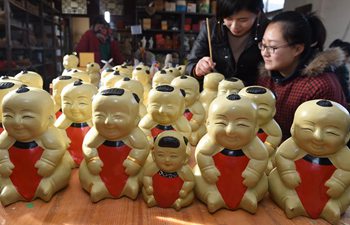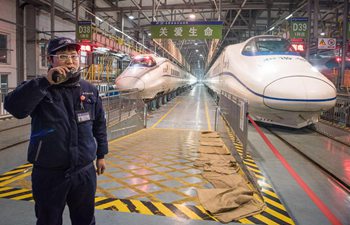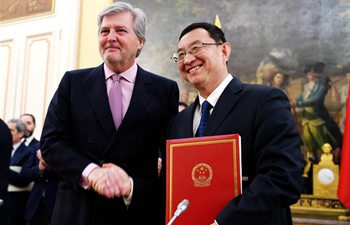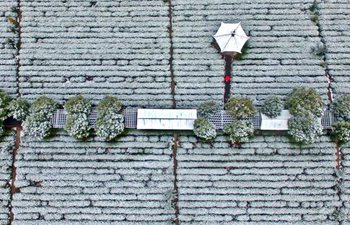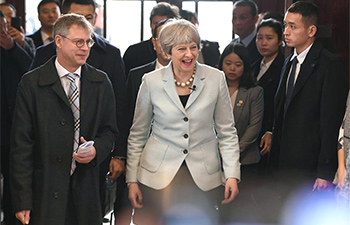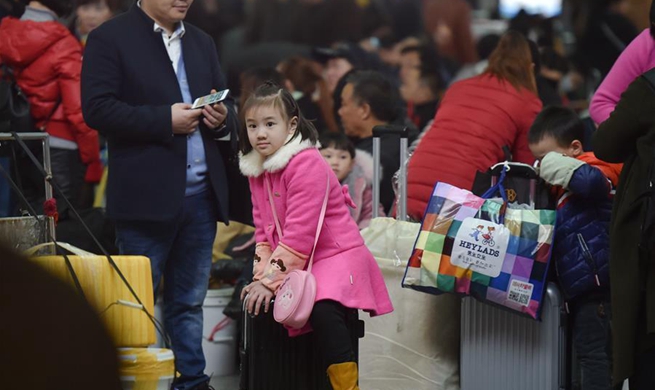BEIJING, Jan. 31 (Xinhua) -- Demand for China's "maternity matrons" has grown since the end of the one-child policy in 2016. However, the quality of these nanny services for new mothers has been questioned amid reports of infant maltreatment and other incidents.
Mai Tian, an employee of a state-owned enterprise in Foshan City in south China's Guangdong Province, said she started looking for a maternity matron, or "yuesao" in Chinese, when she was six months pregnant.
She said her search began very late, as many mothers-to-be start looking for a yuesao in the third month of pregnancy.
Salaries for a maternity matron in China range from a few thousand yuan per month to more than 30,000 yuan.
Those who are able to help increase a mother's milk supply or perform infant massage are in high demand, especially with abundant experience and education.
For in-demand maternity matrons, mothers have to book services at least six months in advance.
Mai hired two maternity matrons in the first month after giving birth last year.
The first one was a top-rated maternity matron with a salary of 9,000 yuan (1,423 U.S. dollars) per month. But Mai fired her after 10 days because she failed to satisfy Mai's expectations.
"She would not come to comfort my baby when he was crying. She often locked herself in the room, talking on the phone for a very long time. She even forgot to bring me fruit, which she should have done every day," Mai said.
The second yuesao was found through an intermediary agent. Mai paid 300 yuan to the agent so she could request a new nanny if necessary.
Mai said the second yuesao was more professional in her care, and the payment was 3,000 yuan cheaper than the first she had hired.
"The quality of maternity matrons cannot be ensured just based on their certificates. I believe it all depends on luck," Mai said.
As the maternity care profession in China has grown substantially over the last few years, so have problems associated with the industry, which is plagued by an abundance of fake certificates and a lack of regulation.
"Some maternity matrons obtain maternal-child nursing certificates only after one week of training, or without any training at all, while others just purchase certificates," said a housekeeping company employee who refused to be named.
Complaints about top-rated caregivers maltreating infants or injuring babies because of unprofessional conduct have been reported frequently.
"The number of complaints and incidents is hard to collect since too many disputes occur every year," said Zhu Mingzhong, chairman of the housekeeping service industrial association of northeast China's Jilin Province.
"The market is in chaos," said Zhu. "Industry associations, maternity matron training agencies and housekeeping firms can all issue unofficial certificates. In some areas, you get the certificate as long as you pay the money."
In February 2016, the Standardization Administration of China issued and carried out quality standards for maternal-child nursing services. There is a six-level classification system for nursing services, ranging from one to five stars to the highest level called "golden medal."
The standards stipulate that "golden medal" maternity matrons should have at least two years of experience taking care of women and children. They should also have received professional training, passed examinations, and obtained certificates including senior housekeeper, senior baby nurser and intermediate nutrition certificates.
However, it is hard to implement the standards strictly, so the quality of postpartum caregiving services cannot be guaranteed.
"A newborn baby's immunity is very low. Any unprofessional conduct could lead to harm. Maternity matrons, especially those 'golden medal' ones, should have more professional nursing skills," said Song Yan, an expert at Chengdu Women and Children's Central Hospital.
Kou Yi, a Chengdu-based lawyer, suggested relevant departments improve management rules and regulations and establish an evaluation mechanism that allows consumers to give feedback on their yuesao's service.




